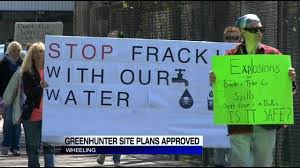Big Fracking Waste Water Story of 2013 in Northern WV Panhandle
From the Article by Casey Junkins, Wheeling Intelligencer, Dec. 25, 2013
In March, GreenHunter Vice President John Jack stated that officials would build a “first-of-its-kind in the country” frack water recycling plant in Wheeling to meet the growing needs of the Marcellus and Utica shale drilling region. Further, that this project would be built at the former Seidler’s Oil Service on North 28th Street (Warwood), Wheeling, WV.
Even though GreenHunter has permission to build “Phase 1″ of its planned facility at the former Seidler’s Oil Service on North 28th Street, construction has yet to begin. In the yet-to-be-approved “Phase 2,” GreenHunter would also like to place the frack waste on Ohio River barges so that it can be taken down river for disposal in landfills.
As the year closes, those on both sides of the GreenHunter debate wait to see what 2014 will hold for the construction of the $1.7 million facility that is immediately adjacent to the Wheeling Heritage Trail. GreenHunter officials say their process is safe and their provisions to control any potential spills meet U.S. Environmental Protection Agency specifications.
During both the June and July meetings, members of the Wheeling Planning Commission declined to consider GreenHunter’s application because they required additional information from the company.
However, in August, commissioners Barry Crow, Thomas McCulloch, Don Atkinson and Russell Jebbia voted to approve the plant, while Commissioner John Clarke voted against it. Commissioner Michael Leo recused himself from voting, citing a conflict of interest. Commissioner James Mauck – serving in the role of chairman due to the absence of regular Chairman Howard Monroe – did not vote, as the chairman normally only votes to break a tie.
Since the August approval, however, GreenHunter has been waiting to get word on whether the Coast Guard will allow barging of the frack waste. No visible construction or demolition has taken place at the site.
Jack said the West Virginia Department of Environmental Protection will do a “walk-through” inspection of the plant once it is up and running. However, DEP officials recently said GreenHunter does not need a permit from the agency.
Some Opposition
Along with the protesters the two primary opponents to the GreenHunter facility are Wheeling City Councilwoman Gloria Delbrugge, who lives in and represents Warwood, and Ben Stout, a Wheeling Jesuit University biology professor.
“I don’t think that a facility like this belongs near a residential area. Too many people are too close – and the stuff is way too nasty,” Stout said. “This stuff is hazardous waste.”
Officials with the Nuclear Regulatory Commission said the brine GreenHunter wants to recycle in Warwood can contain radioactive radium and radon. Though radium, uranium and radon are considered radioactive, Jack said these elements will be minuscule in volume. He also said the company’s workers will wear radiation detectors while on the job.
This is not good enough for warriors Erin Bowers and Kate Marshall.
“There are going to be toxic, radioactive chemicals in that water they are bringing in by truck. What if there is a spill?” Bowers said.
“As a parent of Warwood children, I do not feel the Wheeling Planning Commission planned for my children’s future,” Marshall said. “This is going to hurt residents, hurt property values and hurt our health.”
“I don’t want to drink radiation,” added Peters Run Road resident Mark Eddy.
Ongoing Contention
The U.S. Coast Guard recently accepted public comments regarding whether fracking waste can be shipped on inland waterways by barge, but has yet to make a decision.
Stout took his fight to Charleston, as he testified to the Joint Legislative Oversight Commission on State Water Resources. He said arsenic, barium and bromides are some of the potentially hazardous compounds Stout said GreenHunter could be trucking into the site. He also does not believe the DEP will oversee the project.
Jack has said a 40-foot-wide easement that crosses the trail gives the company the right to use the pipeline that runs underneath it to load treated water onto barges for transport, despite that strip of land being zoned residential.
However, Wheeling City Manager Robert Herron maintains GreenHunter will need a zone change to use this pipeline. They believe the area of the Wheeling Heritage Trail, under which the pipeline runs, is zoned for residential use, rather than industrial or commercial use.
Either way, both sides agree GreenHunter will need to present “Phase 2″ to a future planning commission meeting if it is going to barge the frack waste.


{ 1 comment… read it below or add one }
Almost all of what you state is astonishingly appropriate and that makes me ponder why I had not looked at this with this light before. When the Ohio River and all the various water supplies are at risk, I become very nervous. Thank you for this information update.